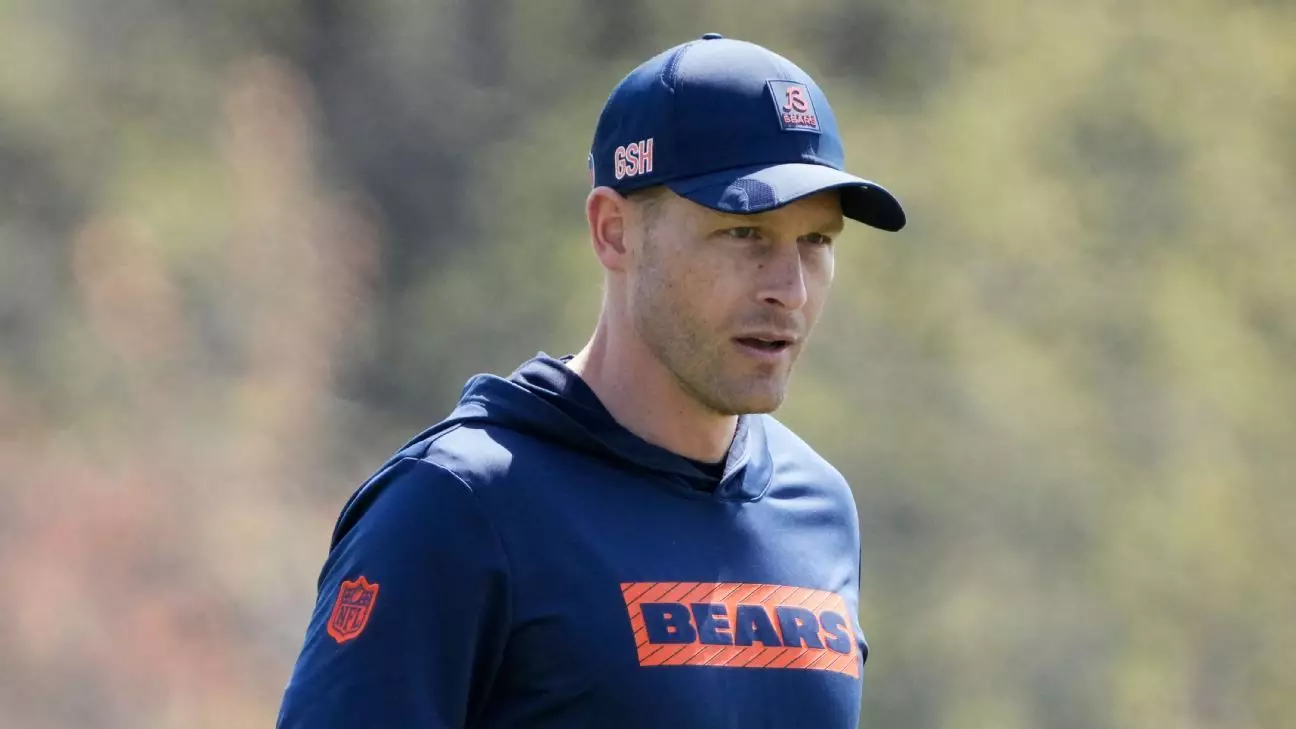As the winds of change sweep through Lake Forest, Illinois, new head coach Ben Johnson of the Chicago Bears confronts an unremarkable legacy head-on. The Bears’ long-standing issues with quarterback development are not merely problems on paper; they symbolize missed opportunities and a culture that has stunted player growth. However, rather than viewing the franchise’s indifferent history as a burden, Johnson sees it as a chance to redefine the organization. “I love it,” he remarked with enthusiasm, signaling his readiness to write a compelling new chapter for the team.
The narrative surrounding the franchise indeed requires a considerable overhaul. Caleb Williams, a highly touted quarterback prospect, had a turbulent rookie season marred by discord and frayed relationships with coaching staff. Many learned of Williams’ desire to be drafted by rival Minnesota Vikings instead of the Bears, emphasizing how precarious the organization’s reputation has become. Indeed, the words spoken by his father, Carl Williams, resonate: Chicago is where “quarterbacks go to die.” Such statements clarify the urgency surrounding the Bears’ endeavors to innovate and uplift its quarterback room—a radical departure from its tarnished past.
From Despair to Determination
Johnson’s approach towards Caleb Williams, who held heavy expectations as a first-round draft pick, signals a refreshing outlook. In a recent conversation post-firestorm, Johnson expressed optimism about their collaborative future. Notably, he emphasized Williams’ autonomy, articulating that the young quarterback would be treated as “his own man.” This comment reveals a coaching philosophy that respects player agency, contrasting sharply with previous environments that may have stifled quarterback talent.
It’s vital to acknowledge the disconnect between Williams and former offensive coordinator Shane Waldron, which exacerbated the difficulties of Williams’s inaugural year. Wickersham’s insights pointed toward a lack of guidance, leaving Williams to navigate the complexity of the NFL landscape in solitude. This situation highlights not just the importance of structured coaching but also the need for a supportive environment where players can thrive. Johnson’s acknowledgment of these failures speaks volumes—he aims to establish a culture of accountability and growth.
Cultivating Trust and Rapport
Trust is fundamental in any collaborative relationship, and Johnson recognizes this as the cornerstone of his connection with Williams. Acknowledging that building rapport takes time, Johnson intends to inspire a strong bond that will ultimately benefit both player and team. “The more time we spend together, he understands I have his best interests at heart,” he stated. This kind of understanding could redefine the trajectory for the Bears’ quarterbacks.
Moreover, Johnson’s experience as the offensive coordinator for the Detroit Lions provided him with invaluable insights into building an efficient offense and nurturing young talent. His winning mindset, coupled with enthusiasm for establishing a transformative atmosphere, may signal a promising shift for the Bears, who boasted a disheartening 5-12 record last season. The ambition to turn a team once written off into a contender will be no small feat, but with the right blending of leadership and talent, Chicago could surprise its critics.
Looking Ahead: The Burden of Excellence
If there is any takeaway from Johnson’s remarks, it is that the Bears franchise is working with purpose, seeking not just to improve but to excel. The path to success will undoubtedly be littered with challenges; nonetheless, ambition without fear leads to growth. The Chicago Bears, rooted in their football tradition, now have an opportunity, via a renewed perspective under Johnson’s leadership, to perpetuate a legacy of excellence—transforming from a team shunned as a quarterback graveyard into a powerhouse of potential.
As Johnson embraces this opportunity, he will face scrutiny at every turn from fans and analysts alike. For the Bears, the only way forward is upwards, and that journey now primarily rests on their ability to cultivate a platform where quarterbacks can flourish—crucial not only for the player’s development but for the revitalization of an entire franchise. The road ahead teems with potential and promise, setting the stage for an exhilarating chapter in Bears football.


Leave a Reply